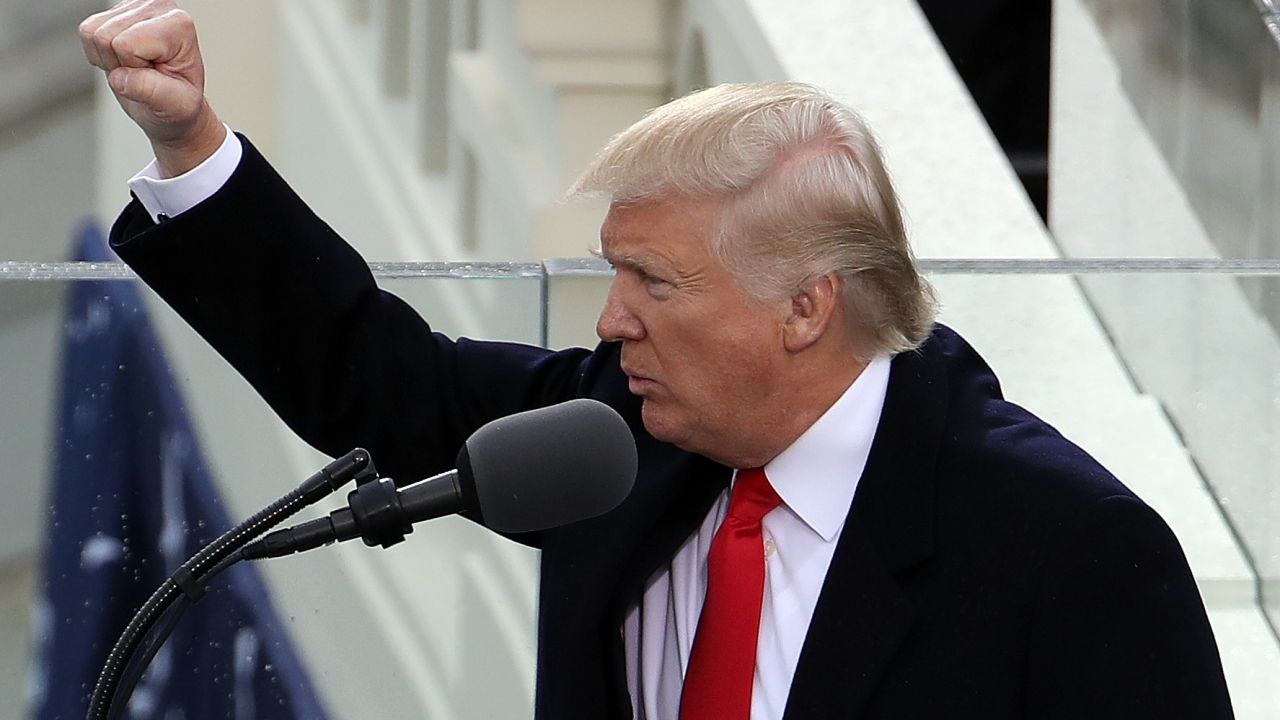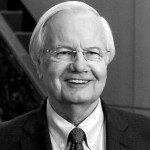
President Donald Trump gestures after delivering his inaugural address on the West Front of the US Capitol on Jan. 20, 2017 in Washington, DC. (Photo by Drew Angerer/Getty Images)
Throughout the campaign and the transition period leading up to the Inauguration, whenever Donald Trump was caught lying or tweeting something outrageous we were told by his acolytes that we should ignore his words and instead pay attention to his deeds. Kellyanne Conway, Trump’s Queen of Bull, who has moved from campaign manager to White House counselor, actually has argued that what he says should not be taken literally, even telling CNN’s Chris Cuomo, “You always want to go with what’s come out of his mouth rather than look at what’s in his heart.”
Well, we’re journalists, not cardiologists but okay, by that standard, President Trump’s inaugural address was of a piece, much of it appealing to his core constituency — white workers and the middle class angry that they’ve been left out of the good times, as indeed they have been. But the speech was hollow rhetoric when compared to all the things Trump and his fledgling administration actually have done in just the last few weeks and hours.
“Today, we are not merely transferring power from one administration to another or from one party to another,” Trump declared. “But we are transferring power from Washington, DC, and giving it back to you, the people… The establishment protected itself but not the citizens of our country. Their victories have not been your victories. Their triumphs have not been your triumphs.”
Fine, we’ll do as Kellyanne Conway recommends. Rather than heed the rhetoric we’ll look at his deeds and try to plumb the depths of his tiny heart. Truth is, Donald Trump has surrounded himself with many of the very elitists responsible for the plight of those everyday people he promised never to forget. The establishment he decried in his speech is front and center; six Goldman Sachs alumni alone already are in his administration, including Treasury Secretary-designate Steve Mnuchin, the man who parked a hundred million dollars in an offshore account and forgot to tell the Senate about it (we’re not making this up).
Trump bragged Thursday night about the collective high IQ of his Cabinet but the real number that’s troubling, as the website Quartz noted last month, is that the first 17 people he named to the Cabinet or Cabinet-ranking posts “have well over $9.5 billion in combined wealth… This collection of wealth is greater than that of the 43 million least wealthy American households combined.”
Let that sink in. Those first 17 people plucked by Trump to help him govern have more wealth “than over one-third of the 126 million households total in the US. Affluence of this magnitude in a US presidential Cabinet is unprecedented.”
How about billionaire Wilbur Ross firing an undocumented household staff member to avoid being embarrassed when Trump picked Ross as secretary of commerce? Could it be he suddenly developed an interest in immigration policy?
Or Labor Secretary-designate Andrew Puzder, CEO of Carl’s Jr. and Hardee’s restaurants, his profits built on cutting corners and paying workers the lowest wages possible. Unless he has suddenly developed the common touch, it’s not likely he’ll be a robust advocate for blue- and white-collar workers.
Or Education Secretary-designate Betsy DeVos, whose confirmation hearings this past week revealed she knows almost nothing about public education — which, by the way, she doesn’t believe in — but whose lack of credentials pale in importance beside the more than $20 million she and her family have given to Republican candidates at the federal level, including many of the senators who will vote for her confirmation.
And how about Trump himself — stopping his inaugural parade to get out of his limousine in front of his DC hotel, of course — but so far failing to keep his promise last week that by Jan. 20 he would transfer complete control of his businesses? According to Pro Publica’s Derek Kravitz and Al Shaw, none of the required documents have been filed.
No time for that, apparently, but plenty of time during his first hours in office to eliminate a climate change page on the White House website and replace it with attacks on the “burdensome” regulation of the energy industry — exactly what the global warming giants of fossil fuel sought to achieve with their campaign contributions. The new president already has forgotten those ordinary people out there experiencing the erratic weather brought on by climate change, many of them watching the waters rise around their homes and small businesses. Perhaps Trump plans to build them an ark.
Speaking of everyday people: If you’re one of the homeowners struggling to make ends meet, some of the people Trump pledged in his inaugural address to defend, consider this as well: One of his first executive orders Friday suspended his predecessor’s plan to decrease insurance premiums on Federal Housing Administration mortgages, a move Obama intended to help stabilize the housing market. Congratulations — if you’re one of those mortgage holders, you’ve been Trumped!
“A punch in the gut to middle-class buyers” — that’s how it was described by Sarah Edelman, director of housing policy at the Center for American Progress. “…With mortgage interest rates already on the rise, reversing the FHA’s move to cut insurance premiums in fact puts the dream of homeownership farther out of reach for millions of hardworking Americans.”
Contrast that cheapskate move with the money being spent on Trump’s big inaugural weekend. Nicholas Fandos at The New York Times reported last week that, “All told, the group planning the inaugural festivities says it has raised more than $100 million, which would be nearly double the record for an inauguration, with much of it coming in six- and seven-figure checks from America’s corporate suites.” That includes a million bucks from Boeing and half a million from Chevron. A small price to pay for the kind of influence and thinly veiled bribery that are sure to characterize the Trump years.
“We will make America wealthy again,” Trump bellowed in his speech — he just didn’t say that the wealth won’t be shared. Fact is, “the forgotten men and women of our country” whom Trump addressed in the speech don’t have a chance against the army of influence peddlers with whom the new president already has surrounded himself.
For example, it was announced on Thursday that 13 — yes, 13 — lawyers from the high-powered law firm of Jones Day will be moving to top positions in the administration, seven of them at the White House alone. It’s s “a ton of top jobs” for one Washington firm, as David Lat of the website Above the Law put it: “This is very good news for Jones Day and the lawyers remaining at the firm. It’s great for the firm’s prestige, and it also means that JD lawyers will be eagerly sought after by clients with issues pending before their former colleagues.” (italics added).
This must be what they mean by “draining the swamp” — they just divert it over to the White House.
A pall of contradiction hung over the whole ceremony Friday — between the rhetoric aimed at those millions of working people and middle-class Americans to whom Trump said he was talking and the fabulous wealth concentrated in his personal and official circles. Not once did he mention the words democracy, or equality, or even the Constitution. And while the clergy who offered prayers frequently invoked the names of God and Jesus, no one disturbed the official piety by reminding the privileged and powerful gathered around the new president that Jesus told his followers, “… I was hungry and you gave me food. I was thirsty and you gave me drink. I was a stranger and you welcomed me.”
Or had said to a certain rich young man: “You lack one thing. Sell what you own and give the money to the poor, and you will have treasure in heaven. Then come, follow me.”
Or had admonished his followers: “When you give a banquet, invite the poor, the crippled, the lame and the blind.”
It wasn’t that kind of affair, of course. Instead, a few hours after the swearing-in, President Trump, in another of his first official acts, signed an executive order moving forward the repeal of the Affordable Care Act, which could ultimately remove 18 to 32 million people from health insurance. Many of them presumably voted for Trump. Not a few may now need a miracle to survive.
By the way, according to Darren Samuelsohn at Politico, the end of the ACA would personally save our billionaire president “at least $6.7 million” in Medicare taxes.
Let us pray. After we march.





